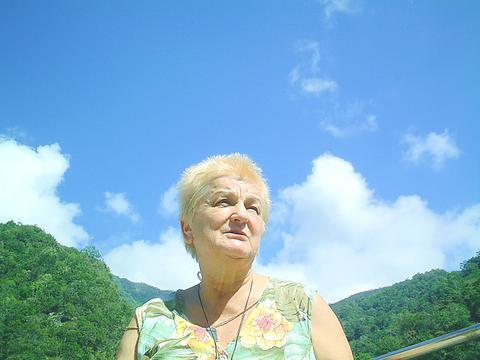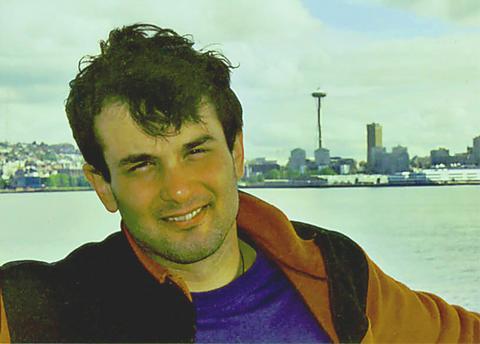Most days are the same for Barbara Klita. She wakes, dresses and drapes herself in a clapboard sign bearing images of her son, Fred Frontier, and bold-face Chinese characters asking if anyone has seen him. She has breakfast at McDonalds and heads out to meetings with someone who has offered her some type of assistance in the search for her son.
It's been a year to the day since Frontier is believed to have walked off on a day hike in Taroko National Park, Taiwan's postcard-picturesque east coast tourist destination. He'd come to teach English at a Hess language school and had been in the country just three days after arriving from his home in Seattle, Washington. An avid outdoorsman, he quickly made his way to Taroko to check out some of the sites he'd read about in his dog-eared copy of Lonely Planet's Taiwan guidebook. He packed a change of clothes and a Pentax camera in a small backpack and a few items in a red waist bag, checked out of the Catholic hostel at which he was staying and set off to explore the park. Ten days later the bags mysteriously made their way back to the hostel, but there is no indication that Frontier ever did.
A month after his disappearance, he was reported missing and two months after that authorities conducted the first physical search for him. His mother came to Taiwan to assist in the investigation and has been here for much of the past year prodding the police and government. Despite her efforts, the case has stalled.

PHOTO: DAVID MOMPHARD, TAIPEI TIMES
Klita's world is bound in a bulging plastic business card holder held together with a black rubber band. Hundreds of cards from all the people she's met in the past year have notes scribbled in the corners. It's a ragtag rolodex filled with the names of government officials, police administrators, attorneys, reporters, Buddhist monks, fortunetellers and US governors.
She's a Polish immigrant to the US whose accented English has kept her from securing part-time work teaching language at a bushiban, and so she lives off her modest savings and the kindness of strangers. The government has granted her a five-year renewable visa. She had been staying on a cot in a Taipei hostel until an attorney spotted her clapboard and offered her a spare room in his home. A devout Catholic, she says it's her faith that keeps her company in a country where she doesn't speak the language.
At lunch earlier this week, she crossed herself before a McDonalds Fillet-O-Fish and recounted the few facts she's learned over the past year and the many questions that remain unanswered.

PHOTO COURTESY OF BARBARA KLITA
"The police still know nothing," she said. "I ask them: What about Fred's bag? Who brought them back to the hostel? What about the people that were at the hostel at the same time as Fred? What do they remember?' The police say they will go ask and then they never tell me what they learn."
She has presented letters to the Presidential Office, the American Institute in Taiwan, the National Police Administration and others, asking for such simple things as an official report on the status of her son's case, and that all the information that's been collected be compiled in a single place to better coordinate the investigation. She claims the requests have not been met.
None of the law enforcement officials contacted for this report were willing to go on record, but some intimated that, in all likelihood, Frontier simply stepped off one of the many trails that cling to cliffs throughout the national park. The steep, densely foliated terrain, they say, has hindered their ability to recover his body.
"But what about his bags?" Klita asks. "If he fell off a cliff, why wasn't he carrying his bags? When did he take them off? Where? How did they get back to the hostel 10 days later? Why can't police find the white car, or who took the photo with Fred in it? "
Police developed the film from Frontier's camera that was found along with his backpack: 16 photos of marble-bedded rivers, the monastery in Tienhsiang and, most notable, a shot of him smiling and leaning against a white car. Who took the photo and whose car Frontier is leaning against remains unknown.
Klita has little faith that local law enforcement authorities will uncover any more information than they already have. In Taiwan, she says, someone can shoot the president in the middle of the day and they won't find him.
She said she would like to hire a private investigator but does not have enough money. "Private investigators don't shake hands with police, they shake hands with mafia. They can learn what happened to Fred," she said, adding that she believes her son may have been a victim of wrongdoing.
She's spoken with monks.
"One of the monks told me that Fred is still in Taroko. He's in a place where he can see others but no one can see him. That's why they don't find him," she said. "Very strange."
"Another woman last week wanted to teach me how to pray to Buddha," Klita continued. "She had me say the same sentence over and over. `Oh ma to somethingorother.' I didn't want to be impolite, but I was not interested in that. It won't help find Fred."
She's visited fortunetellers.
"Seven of them. One was in Hualien; a very old woman. I asked, `How do I pay her?' and they told me she likes the Taiwan vodka and chews ? you know ? the dope," she said eating an imaginary betel nut. Other fortunetellers have "pinpointed" Frontier's location by marking maps with circles that encompass thousands of acres.
Most recently she's called on a governor. Frank Murkowski, the governor and former senator of her adopted state, Alaska, was in Taiwan Thursday as part of the US' official delegation to President Chen Shui-bian's (
Most days, she says, are spent toting her clapboard around Taipei. In the afternoons, she goes to a room in the library that has been set aside for her use. There she types letters to local officials and sends e-mail messages to US officials she hopes might help her, and keeps in touch with friends back home. In the evenings, she returns to the spare room, prays to squelch sadness and sleeps.
"I took a vacation in January," she says finishing her fish sandwich. "For a month I went to Australia and stayed in Catholic hostels there. It was wonderful fun! Many kids from America, England, Canada I spent time with. ? They are all doing what Fred would be doing.
"But then I come back to this," she said, and gripped her clapboard sign. "If my son is alive, show me where he is. If he is dead, show me his body. I need closure."
A benefit concert for Fred Frontier is taking place at the Youth Activity Center in Tienhsiang this evening and tomorrow evening beginning at 5pm, with music from Doughlas Newton, Scott Ezell, Eddie, Leslie and anyone else who'd like to join a jam session. Transportation is available from Hualien by calling Eric Lier of the Overseas Americans in Taiwan at (0938) 428 681.

On April 26, The Lancet published a letter from two doctors at Taichung-based China Medical University Hospital (CMUH) warning that “Taiwan’s Health Care System is on the Brink of Collapse.” The authors said that “Years of policy inaction and mismanagement of resources have led to the National Health Insurance system operating under unsustainable conditions.” The pushback was immediate. Errors in the paper were quickly identified and publicized, to discredit the authors (the hospital apologized). CNA reported that CMUH said the letter described Taiwan in 2021 as having 62 nurses per 10,000 people, when the correct number was 78 nurses per 10,000

As we live longer, our risk of cognitive impairment is increasing. How can we delay the onset of symptoms? Do we have to give up every indulgence or can small changes make a difference? We asked neurologists for tips on how to keep our brains healthy for life. TAKE CARE OF YOUR HEALTH “All of the sensible things that apply to bodily health apply to brain health,” says Suzanne O’Sullivan, a consultant in neurology at the National Hospital for Neurology and Neurosurgery in London, and the author of The Age of Diagnosis. “When you’re 20, you can get away with absolute

May 5 to May 11 What started out as friction between Taiwanese students at Taichung First High School and a Japanese head cook escalated dramatically over the first two weeks of May 1927. It began on April 30 when the cook’s wife knew that lotus starch used in that night’s dinner had rat feces in it, but failed to inform staff until the meal was already prepared. The students believed that her silence was intentional, and filed a complaint. The school’s Japanese administrators sided with the cook’s family, dismissing the students as troublemakers and clamping down on their freedoms — with

As Donald Trump’s executive order in March led to the shuttering of Voice of America (VOA) — the global broadcaster whose roots date back to the fight against Nazi propaganda — he quickly attracted support from figures not used to aligning themselves with any US administration. Trump had ordered the US Agency for Global Media, the federal agency that funds VOA and other groups promoting independent journalism overseas, to be “eliminated to the maximum extent consistent with applicable law.” The decision suddenly halted programming in 49 languages to more than 425 million people. In Moscow, Margarita Simonyan, the hardline editor-in-chief of the